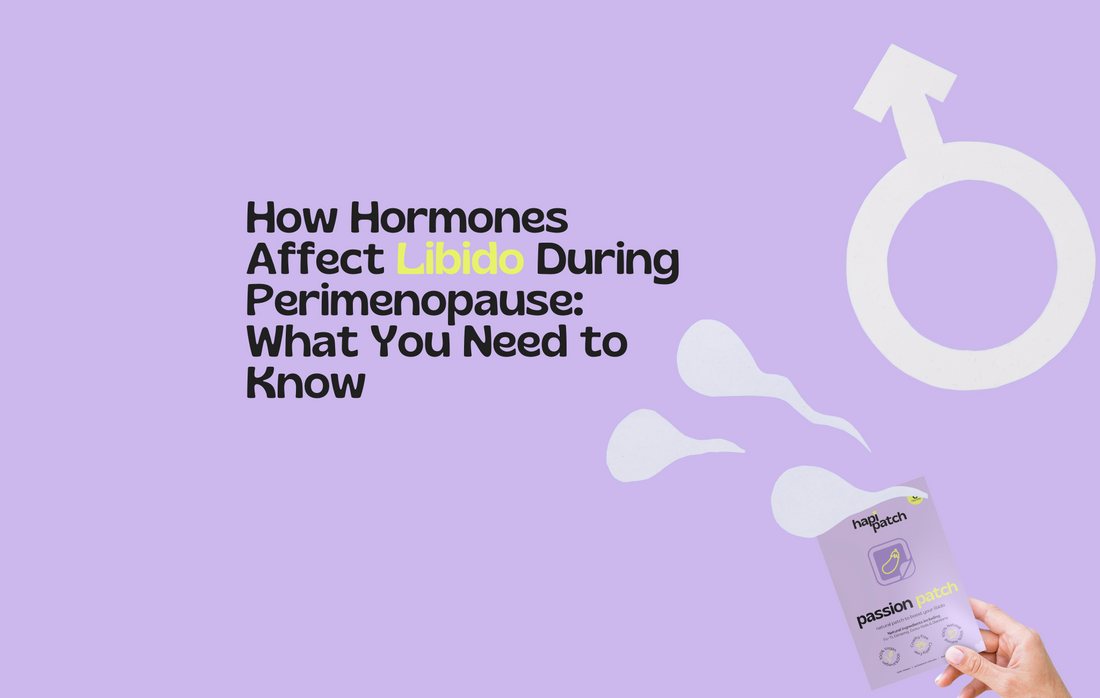Perimenopause is the transitional phase before menopause, often lasting several years, during which a woman’s body undergoes significant hormonal changes. These shifts can lead to a variety of symptoms, from hot flashes and mood swings to irregular periods and, for many women, a decrease in libido. The fluctuations in oestrogen, progesterone, and testosterone during perimenopause play a key role in how sexual desire and overall energy levels are affected.
In this blog, we’ll dive into the science of how hormones impact libido during perimenopause and explore natural solutions, including how The Passion Patch can help stabilise hormonal fluctuations and support a healthy sex drive.
What Happens to Hormones During Perimenopause?
Perimenopause is the period leading up to menopause, typically beginning in a woman’s 40s, although it can start earlier or later depending on individual health factors. It can last anywhere from a few months to over 10 years. During this time, hormone production becomes erratic, with oestrogen and progesterone levels rising and falling unpredictably.
This hormonal chaos can lead to a wide range of symptoms, including changes in sexual desire. For many women, perimenopause feels like an emotional and physical rollercoaster, especially in terms of libido. The following are key hormones that play a major role in libido and how their changes affect sexual desire during perimenopause:
- Oestrogen
Oestrogen is the primary female sex hormone responsible for regulating the menstrual cycle, maintaining vaginal health, and supporting sexual desire. As women approach menopause, oestrogen levels begin to fluctuate wildly. These fluctuations can lead to vaginal dryness, which may make sex uncomfortable or painful, and as a result, reduce sexual interest.
- Progesterone
Progesterone works alongside oestrogen to regulate the menstrual cycle and support a stable mood. As progesterone levels decline, many women experience mood swings, anxiety, and irritability. These emotional changes can further dampen libido, as it becomes harder to feel relaxed and in the mood for intimacy.
- Testosterone
Testosterone, often thought of as a "male" hormone, is equally important for women. Although women produce much lower levels of testosterone than men, this hormone is crucial for maintaining sexual desire, energy levels, and mood stability. During perimenopause, testosterone production decreases, leading to a significant drop in libido and overall vitality.
How These Hormonal Changes Affect Libido
The unpredictable fluctuations of oestrogen, progesterone, and testosterone during perimenopause directly impact libido in several ways:
- Decreased Sexual Desire: With oestrogen and testosterone levels in flux, many women report feeling less interested in sex or having difficulty becoming aroused.
- Vaginal Dryness: As oestrogen declines, the vaginal walls become thinner, and natural lubrication decreases. This can make intercourse uncomfortable or even painful, further reducing sexual desire.
- Fatigue and Low Energy: Testosterone supports energy levels and physical stamina, but as testosterone levels drop, many women experience fatigue and a lack of motivation for sexual activity.
- Emotional Changes: Mood swings, anxiety, and irritability—common symptoms of perimenopause—can make it difficult to feel emotionally connected to a partner or interested in intimacy.
Emotional and Psychological Impact on Libido
Perimenopause can be a challenging time emotionally as well as physically. Many women feel frustrated or confused by the changes happening to their bodies. When libido decreases or becomes unpredictable, it can lead to feelings of inadequacy or frustration in relationships. Women may feel like they are no longer in control of their bodies, which can negatively impact their self-confidence and sense of sexual identity.
The emotional side of perimenopause can compound the physical symptoms. If a woman feels anxious, overwhelmed, or disconnected from her partner, she may find it more difficult to engage in or enjoy sexual activity. It’s essential to recognise that these feelings are a normal part of perimenopause and that there are ways to manage them naturally.
How The Passion Patch Can Help Stabilise Libido During Perimenopause
The Passion Patch offers a natural and effective solution for women navigating the hormonal ups and downs of perimenopause. By using transdermal technology, The Passion Patch delivers a steady dose of natural libido-boosting ingredients directly into the bloodstream, bypassing the digestive system for faster and more consistent absorption.
Key Ingredients in The Passion Patch:
- Tribulus Terrestris: This herb is known for its ability to naturally boost testosterone levels, which can help restore sexual desire during perimenopause.
- Ginseng Extract: Ginseng is a natural energy booster that helps combat fatigue and stress, both of which are common during perimenopause and can negatively affect libido.
- Damiana Extract: Known for its mood-enhancing properties, Damiana helps reduce anxiety and improve sexual function, making it easier to enjoy intimacy.
- L-Arginine: L-Arginine supports healthy blood flow, which is crucial for physical arousal. By increasing circulation, this amino acid helps improve sensitivity and sexual pleasure.
By delivering these active ingredients through the skin, The Passion Patch ensures that they are absorbed efficiently and consistently, providing continuous support for libido throughout the day. This makes it easier for women to maintain a healthy sex drive, even during the hormonal fluctuations of perimenopause.
The Science Behind Transdermal Delivery
One of the reasons The Passion Patch is so effective is its use of transdermal technology. Unlike oral supplements, which can lose potency as they pass through the digestive system, transdermal patches deliver active ingredients directly into the bloodstream. This method allows for faster absorption and a more controlled release of ingredients over 24 hours.
The 4-layered matrix design of The Passion Patch ensures that each ingredient is released steadily throughout the day, providing consistent support for libido, energy, and mood. This continuous release helps counteract the hormonal fluctuations that occur during perimenopause, making it easier to maintain sexual desire and emotional balance.
Additional Ways to Support Libido During Perimenopause
While The Passion Patch provides excellent support for managing hormonal fluctuations and boosting libido, there are additional lifestyle changes that can further improve sexual health during perimenopause:
- Exercise Regularly
Regular exercise can help balance hormones, improve circulation, and boost energy levels. Strength training, yoga, and cardiovascular exercise can all support libido by increasing blood flow and reducing stress.
- Eat a Hormone-Supportive Diet
Eating a balanced diet rich in omega-3 fatty acids, magnesium, and zinc can help support hormone production and improve overall health. Foods like salmon, leafy greens, nuts, seeds, and whole grains are excellent for maintaining energy levels and supporting hormonal balance.
- Manage Stress
Stress can exacerbate hormonal imbalances and lower libido. Mindfulness practices like meditation, deep breathing, or yoga can help reduce stress and improve emotional well-being, making it easier to feel connected and interested in intimacy.
- Get Quality Sleep
Perimenopause can disrupt sleep patterns, but quality sleep is essential for hormone regulation. Aim for 7-9 hours of restful sleep per night to support hormone production and maintain libido.
FAQ: Perimenopause and Libido
- Why does my libido fluctuate during perimenopause?
During perimenopause, oestrogen, progesterone, and testosterone levels fluctuate unpredictably, causing changes in sexual desire, energy, and mood.
- Can The Passion Patch help with perimenopausal libido loss?
Yes, The Passion Patch delivers natural libido-boosting ingredients that support hormone balance and improve sexual desire during perimenopause.
- What are common symptoms of perimenopause that affect libido?
Symptoms such as vaginal dryness, mood swings, fatigue, and decreased testosterone levels can all impact libido during perimenopause.
- How long does perimenopause last?
Perimenopause can last anywhere from a few months to over 10 years. It typically begins in a woman’s 40s but can start earlier or later depending on individual health factors.
- What lifestyle changes can help improve libido during perimenopause?
Regular exercise, a hormone-supportive diet, stress management, and quality sleep can all help support libido during perimenopause.

